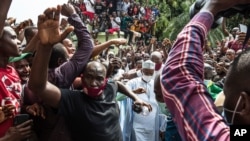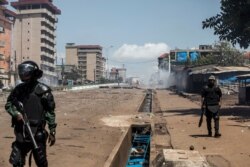The West African nation of Guinea is bracing for more postelection unrest after the country's Election Commission on Saturday declared full preliminary results showing President Alpha Conde was reelected for a third term.
The commission said Conde won the October 18 election with 59.5% of the vote. The victory which requires confirmation by the Constitutional Court, gives a third term in office to Conde, 82, after a bitterly fought election in which the opposition said he had no right to participate.
Even before the results were announced, opposition leader Cellou Dalein Diallo alleged fraud and declared himself the winner, prompting street protests in opposition strongholds in which at least 17 died.
The capital, Conakry, was mostly calm on Saturday as Conde supporters in yellow T-shirts celebrated by driving around the city center. Elsewhere, soldiers in red berets patrolled the streets in trucks, some fit with gun turrets, a Reuters witness said.
Opposition activists such as Mamadou Billo Bah said they would keep protesting Conde’s taking of a controversial third term in office.
Billo Bah said the protesters were mentally ready because they understood they were facing a dictator. Therefore, he said, they are prepared to be arrested, to experience violence, to be killed. He added that if people were ready to face all of this, they were not scared about it. And, he added, the protesters' lives are not more valuable than the lives of those who have already died.
Conde’s supporters say the third term was legally allowed by a March constitutional referendum.
The day after the vote, clashes broke out between security forces and Diallo’s Union of Democratic Forces of Guinea.
Amnesty International researcher Mohamed Barry said dozens of protesters have been killed and wounded this year in election-related violence, but no security forces have been held responsible.
Barry said Guinea’s government has allowed the security forces to enjoy impunity. He said even though human rights activists and political figures have denounced it, there have been no investigations.
Conde's 2010 election after decades in opposition raised hopes for democratic progress in the bauxite-producing West African country.
But his move to run again left many observers worried about a backslide toward authoritarianism in a region that had made strides towards multiparty democracy since the 1990s.
Some information for this report came from Reuters.





